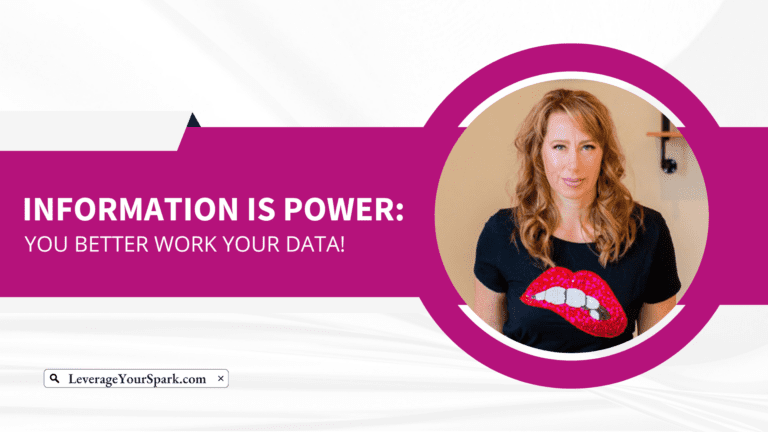Information is Power: You Better Work Your Data!

I know RuPaul was talking about models when he said, “You better work!” but really, he should have been talking about data. I know lots of businesses that have gone to the effort to collect data but then fail to use it. That’s like taking the time to get the hair and makeup done, getting in the outfit, and then not walking the runway. You need to work your data so that it truly works for you.
Listen to Season 1: Episode 15
Step One: Have Data
Before you can start your sashay and work your data, you have to have data to work. If you don’t have data yet, review our previous blogs to get started.
Fortunately, most businesses do have data. The more common issue is that data is being gathered but not used. If you have Facebook or Pinterest, you have data. The question, though, is: Do you ever look at the insights on those platforms?
Sometimes, your data actually gets into a report! Hallelujah! Work your data! Alas, most of the time, that report never even gets looked at. Heel snag and runway crash.
Metrics and data are the landmarks and mile markers on your trek to the treasure (that is, the results you want in your business). But they can’t lead you there if you refuse to use the map.
Step Two: Know Why You’re Creating Reports
Reports elicit the “ugh” factor because rarely is the person or organization willing to be bold enough to “report” only the information that matters to support the decisions that are being made. In their defense, this requires a degree of disagreeableness and regular effort.
And because of that, most reports are an exercise in futility and frustration, knowing that all the work that goes into them is wasted effort. At least that was my experience in every corporate organization I worked for before I had my own business.
Yes, doing reports that way is a complete waste of time, effort, and resources. So let’s all agree never to create those kinds of reports. Okay? It’s really disrespectful to reports and perpetuates their bad reputation.
In order to properly work your data you are collecting, you need to be able to see it and assess it in a way that makes sense for you, your organization, and the kinds of decisions and actions that will result from the data.
That is the purpose of a report. It is the first step in operationalizing data.
Step Three: Work Your Data
Before you define your own way of making your data work, take a moment to toss out your “shoulds.” First off, there is no right way to create a report.
The best way to create a report is whatever way that gets you to actually look at the information. You don’t even have to call it a report. Call it the crystal ball, treasure map, or results atlas. It doesn’t need to be in a document format. Dashboards and graphics work too.
The key to properly work your data is:
Regular reviews: daily, weekly, monthly, quarterly…pick the time frame that fits with the kind of data you are looking at and be consistent. Ads need daily reviews to start and website data is usually monthly, unless you are making changes or running some kind of campaign that is driving a lot of traffic.
Insights: Be sure to look past the data and see what it is telling you. This typically works best if you have questions you are trying to answer using the data (e.g., Where do people come from who opt into our list? What updates should we make to the home page?). Here it is good to remember that data points require context to convey information and for conclusions to be drawn from them.
External perspectives: Sometimes we can’t see the forest for the trees. Getting people outside our immediate business to review our data can help us gain additional insights.
The Benefit of Data That Works
When you work your data in the way that fits your business, decisions are SO much easier, and you can take action faster. Decisions are easier because you can make them based on data, and also you can make a decision, and then get data that informs if you need to change course.
I know I’ve personally avoided decisions because I was afraid of making the wrong ones. But when you have a way to track the outcomes of a decision, fear disappears because you will get the information you need to either validate the decision or make adjustments to something else.
What actions are you ready to take in your business? What decisions do you need to make to take those actions? How will you create your own “crystal ball” to make sure you have the data to make those decisions to take that action? In short, are you ready to work your data?
Help Is Here!
If you want to make smarter business decisions, spend less money on marketing trial and error, and have an overall line of sight on your business health and growth, we can help. Our analytics and reporting service Insight Pro properly sets up metrics in your business and serves them up to you so you can make decisions based on the information that matters to your success. Check it out!

